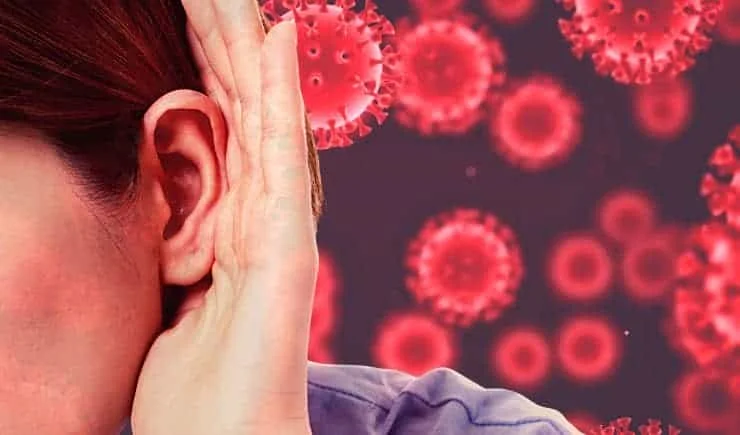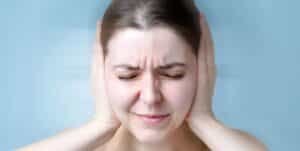Otolaryngologists often observe the sudden onset of sensorineural hearing loss (SSNHL). The exact pathophysiology of the disease is unclear, and the most likely cause is the follow-up of viral infections. Immediate use of steroids is the best treatment to improve the prognosis. Although there are a large number of articles in the literature describing SSNHL, only a few hearing loss cases have been reported after COVID-19. But there is fright about hearing loss that has a chance of occurring after Covid 19, which has to be analyzed, solved, and recorded as early as possible of this problem. So, please pick up the threads of reading to know more about hearing loss post-Covid-19.
What is SSNHL?
Sudden sensorineural hearing loss (SSNHL) is defined as hearing loss of at least three adjacent frequencies of 30 dB or more in 72 hours or less. 1 Hearing loss can range from mild hearing loss to complete loss. Hearing can be temporary or permanent. Regardless of the cause and extent of hearing loss, timely assessment and early treatment are essential. The most important part to notice is that this kind of hearing loss has been identified in people after Covid-19. Medical practitioners and researchers feel that this might be due to the viral infection affecting the hearing nerve at times.
A general practitioner or an ear, nose, and throat (ENT) specialist can organize an investigation, depending on local resources and channels. If the initial response to treatment is poor, the investigation is particularly important. There is an initial hearing test called pure audio tone gram which is used to explore the difference between SNHL and CHL by calculating the air and bone conduction along with their threshold values. The PTA will determine if there is any hearing loss, and the degree and type of loss. Series PTA can be used to determine the response to treatment. Tympanic pressure measurement assesses tympanic membrane mobility and middle ear function. The fluid in the middle ear appears as a “flat” trace (type B tympanogram) and is compatible with CHL. Flexible nasal endoscopy (or nasopharyngoscopy) visualizes the posterior nasal space for possible masses. In some cases, blood tests can determine the cause of SSNHL so that it can be treated directly. It May not require emergency blood tests and can be guided based on clinical findings. These will be the basic steps that will involve identifying the problem regarding sudden sensorineural hearing loss in inpatients.
A deeper look into SSNHL
When doctors and medical field professionals were busy fighting the coronavirus, there were also able to sense the side effects that the virus created. When the world was thinking that Covid-19 would affect only the nasal system, there were cases reporting the sudden sensorineural hearing loss, which created a twist towards a new effect in people.
It is a relatively common pathology in otolaryngology, with 5 to 160 cases per 100,000 people worldwide each year. In most cases, the cause of hearing loss is unproven and is attributed to different pathologies, including pathologies related to viruses, immune-mediated cellular stress, and vascular occlusion. Viruses that cause hearing loss have been described, mainly including herpes species and cytomegalovirus, but these are rarely regarded as the cause of SSNHL. The new SARSCoV2 that caused COVID-19 has affected more than 500,000 people and caused a large number of documented symptoms. The virus mainly affects the upper respiratory system, causing fever and coughing symptoms, leading to pneumonia and multiple organ failure. Most of the observed cases were asymptomatic (20-86% of reported cases) or had mild unreported symptoms. COVID-19-related neuronal inflammation has previously been reported in the context of anosmia, but the relationship between COVID-19 and sensorineural hearing loss has been previously reported. It has not been fully explored so far. Thus, various research is being conducted regarding this is medical field research and will surely come up with a solution that can help the world.
Hearing and Covid-19
Although there is a large body of literature on COVID-19 and the various symptoms associated with the virus, there is a lack of discussion about the relationship between COVID-19 and hearing. Hearing loss and tinnitus are symptoms of patients with COVID-19 and the influenza virus but have not yet been emphasized. In patients with positive SARSCoV2, there were some new cases of sensorineural hearing loss were found, with no previous hearing problems and no other causal relationship.
A 60-year-old man with severe COVID-19 who needs to be hospitalized by the ITU suffered from right deafness and left sensorineural hearing loss and received intratympanic steroids and cochlear implants. Similarly, many people have been reported to have hearing loss due to COVID 19. The Asymptomatic patients presented to the clinic with positive sensorineural hearing loss and SARSCoV2 swabs and received tympanic steroid therapy, and the results improved. Similarly, in the case presented here, the patient was in good health before, and there are no other causes attributable to SSNHL. In this case, patients believe that oral steroids have the greatest benefit, while intratympanic injections of steroids did not gain any additional benefits. It should also be noted that the patient mentioned the difficulty of identifying hearing loss and its subsequent manifestations in a busy ITU environment.
To investigate the presence of SARSCoV2 in patients with sensorineural hearing loss in an ENT clinic, the medical practitioners performed polymerase chain reaction (PCR) tests on SSNHL patients. It was found that 1 out of all five patients was positive for SARS CoV2, except for SSNHL, and had no other new symptoms. It should be noted that the sensitivity of the SARSCoV2 PCR detection varies greatly between the different tests. Recent reviews on this topic cited a sensitivity ranging from 32% to 98%, depending on the location and quality of the sample, the stage of the disease, and the proliferation and shedding of the virus. Therefore, the proportion of patients with sensorineural hearing loss can be considered higher.
It is important to consider the possibility of a relationship between SSNHL and Covid-19 but the study is low. the study proved that the supporting and hair cells of patients infected with SSNHL were devoid or lost the Corti set of organs. This may be having a relation with stress cellular path but with no inflammatory cell infiltration which was identified by Histopathological studies. SARSCoV2 is believed to bind to the ACE2 receptor and exists on alveolar epithelial cells and endothelial cells. It has also recently been found to be expressed in mouse middle ear epithelial cells, vascular striae, and spiral ganglia. Additionally, SARS CoV2 causes inflammation and increased cytokines, such as tumor necrosis factor-alpha, interleukin 1, and interleukin 6.5. Direct entry into the cochlea and inflammation that cause cellular stress are all mechanisms that lead to sustained sensorineural hearing loss. And it can occur in the case of a SARSCoV2 infection. The main motto behind this will be the increased study about the sudden sensorineural hearing loss that is happening to people post Covid-19.
The importance of study in hearing loss post-Covid
Many people in the medical field feel that the study behind hearing loss post-Covid has to be increased, which will help in finding the best solution that is possible. Perhaps the most instructive so far are the results of a survey in the United Kingdom, which found that nearly one in ten coronavirus patients self-reported hearing loss or tinnitus after eight weeks. The people who explored this SSNHL found it surprising as both tinnitus and hearing loss was connected directly and indirectly which might also be because of the side effects of drugs that are being consumed. In other words, there is an urgent need for more research on the long-term hearing consequences of the coronavirus. The author of the June 2020 rapid systematic review on this topic stated that “there is a need to conduct high-quality research to investigate the acute effects of COVID-19 and understand the long-term risks to the vestibular system”.
Other important points to be noted
Some coronavirus patients have reported long-term illnesses and atypical symptoms, called “covid long haulers”. A survey was conducted in nearly 650 airlines where it was found that one-third of people had earaches, and two-thirds had vertigo along with dizziness. Only one patient reported hearing loss. The abstract of the research on this topic states that there does not appear to be a “predictable pattern” of when or why someone will experience these symptoms. Some drugs used to treat coronavirus have a relatively high risk of hearing loss, tinnitus or dizziness, and dizziness side effects.
These antiviral drugs have been known for adverse events such as tinnitus and hearing loss. Symptoms may be misdiagnosed as COVID-19. Hearing loss and the vaccine? After reviewing the CDC vaccine notification system for adverse events, there is no connection between the two Researchers from the Department of Head and Neck Surgery, Otolaryngology, Johns Hopkins University School of Medicine, said that sudden hearing loss and vaccination. The incidence of sudden hearing loss appears to be low in the vaccinated population, although the researchers said the case might be. It is underreported, and their data is a preliminary analysis.
The bottom line
Thus, people, scientists, researchers, and medical practitioners are urging an increase in studying the hearing loss that is happening post-Covid-19. The world is in a situation where things cannot be taken lightly. Thus, if the studies are increased, then there is a huge chance of bidding goodbye to this hearing loss side effect at a very early stage.





